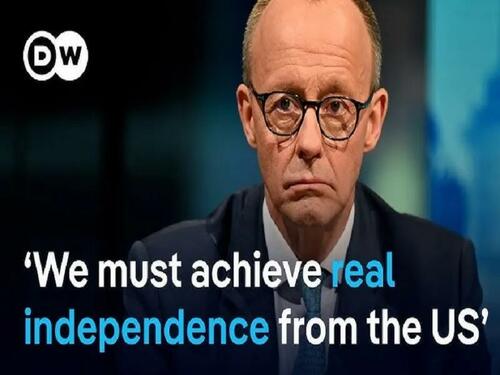Authored by Andrew Korybko via substack,
The US might go along with this though to accelerate the decline of Germany’s “peaceful” hegemony over the bloc in favor of a “multipolar EU” led by a combination of Poland, France, Italy, and others.
Germany’s likely next chancellor Friedrich Merz declared on Sunday after the snap elections’ results started streaming in that he envisages helping his country “achieve independence” from the US. This is a dramatic statement that few could have foreseen any German leader saying just several months ago but that just goes to show how fundamentally Trump 2.0 is revolutionizing International Relations. Here’s what he told a televised roundtable about his foreign policy plans:
“The interventions (meddling) from Washington were no less dramatic and drastic and ultimately outrageous than the interventions we have seen from Moscow. We are under such massive pressure from two sides that my top priority is to create unity in Europe.
My absolute priority will be to strengthen Europe as quickly as possible so that, step by step, we can really achieve independence from the USA.
I would never have believed that I would have to say something like that on television. But at the very least, after Donald Trump’s statements last week, it is clear that the Americans - at least this part of the Americans in this administration - are largely indifferent to the fate of Europe.”
That’ll be a lot easier said than done for several reasons.
To begin with, Germany hosts around 50,000 US troops at five Army garrisons and two Air Force bases. The US also displaced China as Germany’s top trade partner last year. Moreover, the US became Germany’s largest LNG partner last year too, which covered around 9% of its total gas usage last December. These three factors make it difficult for Germany to “achieve independence” from the US but the US might also go along with this for its own purposes.
Many of its troops in Germany can be redeployed to Asia for containing China and/or to Poland as part of that country’s power play to replace Germany as the US’ top ally in Europe. While casual observers might interpret these outcomes as victories for the military dimension of Merz’s policy, they’d come at a huge economic cost to the local communities that are employed by these US bases and receive their troops’ business. This observation segues into the US’ trade leverage over Germany.
While some think that Trump’s threatened tariffs can create strategic openings for China, at present, the EU is actually working with the US to prevent Chinese “overcapacities” in steel and other products from flooding the bloc as they desperately search for new markets amidst Trump’s new tariffs. In other words, Trump’s tariffs have thus far created a domino effect where China tries to dump newly tariffed products onto the EU, which in turn considers tariffing these same products. This works to the US’ advantage.
Lastly, the only realistic way for Germany to “achieve independence” from the US in the energy sphere is to lead the EU in removing the bloc’s anti-Russian sanctions and agreeing to import pipeline gas from it once more, but the Baltic States and Poland stand in the way. Not only that, but the whole reason behind the latest transatlantic rift is Trump’s comparatively softer approach towards Russia, not him going harder on it than they are. It would therefore contradict their logic to lift sanctions on Russia.
Nevertheless, the past three years proved that Germany is willing to sacrifice its objective national interests in pursuit of ideological goals, which in the most recent context refer to signaling displeasure with Trump over his policies towards Russia (and to a lesser extent their domestic socio-legal affairs). Accordingly, it might therefore try to make good on Merz’s pledge to “achieve independence” from the US through the previously mentioned means, though this could be counterproductive as was explained.
Even so, the US might still go along with it by using this as the pretext for redeploying most of its troops in Germany to Asia and/or Poland, which could occur in parallel with targeted sanctions against Germany and the punitive curtailment of the LNG upon which around 1/10th of its gas industry now depends. The combined effect could be economically devastating enough to prompt snap elections or at the very least accelerate the decline of Germany’s “peaceful” hegemony over the bloc in favor of a “multipolar EU”.
What’s meant by that concept is the diversification of power from Germany to a combination of Poland, France, Italy, and others, each of which have strategic bilateral significances for the US such as controlling Central Europe, managing African affairs, and monitoring the Mediterranean. There’d be some collateral damage together with twists and turns along the way, but the processes that the US could set into motion in response to whatever Merz might do could forever change the EU to Germany’s detriment.
